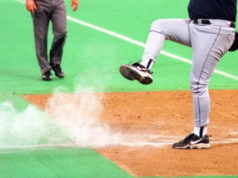It happens. A player has an injury in a game you’ve just officiated. You managed the players and the crowd. The trainers handled the injured player. All you have to do now is go home, relax and put the game behind you.
And pray you don’t get sued.
Authorities on sports law, particularly relating to officials’ rights and responsibilities, advise you to take a few simple precautions following a contest involving an injury.
1. RECORD IT
Write down what happened. It doesn’t matter if you know that a player has been injured in fact, because sometimes during a game you won’t know whether the player really has been injured. Someone might go down and then after the game goes home and finds out he or she really has an injury. In other words, if you perceive that a player has been injured, seriously or not, note it in your head when it happens. As soon as possible after the game, write down the information. Take note of anyone involved in the incident; what happened and when and where it occurred.
2. NOTE WITNESSES
As is the case in any accident or injury, witnesses are important in legal cases. There are two types of witnesses: friendly and independent. Friendly witnesses are people like your officiating partners. Make sure you write in your notes who your officiating partners were that day — names, addresses and phone numbers — so you will have them. Often officials will work with people they may never officiate with again. Independent witnesses (timekeepers and scorekeepers) are often more important than friendly witnesses because they can testify without any bias or prejudice to what happened. They have no vested interest in you personally.
3. INFORM ADMINISTRATORS
Send copies to your local officials association, the league or conference office and the state association, directed to the person in charge of the sport. They may not do anything with the report, but you should keep record that it was sent. That way, in the event of a lawsuit, you have proof that you involved the proper authorities at the time of the incident.
4. KEEP YOUR RECORDS
You also need to keep a copy for yourself. It’s important for the official to be able to find their own copy of incident notes quickly upon request. It makes you appear professional and thorough, so hang onto it in a safe place like a fire-proof filing cabinet or digital cloud storage.
“Administrations change in local (and state) associations, and if you have a change in succession of president or secretary or whoever’s keeping the files, make sure the files go to the next person and they are kept.”
How long should you keep those incident files? There’s a period of time of two or three years in most states during which time someone can sue you for an injury that occurs and if you err, do it on the side of safety and keep it for three years.
ADDITIONAL NOTES
If the injured person is under the age of 18 in any state, the two- or three-year period doesn’t begin to run for the filing of the lawsuit until that person reaches the age of 18.
There are many actual instances of lawsuits being filed 4 or 5 years after an injury to a 13, 14 or 15 year old competitor who has now matured and decided that their injury back then has caused them perceived lasting damage.
That’s one of the major reasons you should always carry comprehensive liability insurance, such as that offered by NASO. Their package covers you for all sports and all levels, so if you never work without it, you’ll never be faced with an incident coming back to haunt you years later for which you’re not protected.
What's Your Call? Leave a Comment:
Note: This article is archival in nature. Rules, interpretations, mechanics, philosophies and other information may or may not be correct for the current year.
This article is the copyright of ©Referee Enterprises, Inc., and may not be republished in whole or in part online, in print or in any capacity without expressed written permission from Referee. The article is made available for educational use by individuals.


















